2018 Scholarship and Seed Grant Awardees
We thank all applicants for their impressive submissions. After a competitive adjudication process, we are thrilled to announce the 2018 scholarship and seed grant awardees.
Scholarship Awardees
 Lindsay Croxall
Lindsay CroxallQueen's |
Lindsay Croxall (Timiskaming First Nation), is currently living in Long Sault Ontario. Lindsay is a Highly Qualified Personal (HQP) with AGE-WELL which is a transdisciplinary network in aging and technology. She is also on the development team for Carleton University's Institute on the Ethics of Research with Indigenous people (CUIERIP), and she is a children's rights advocate with the Family Resource Programs Canada (FRP) and the Landon Pearson Centre. Lindsay has a BA (Hons) in Psychology, an MSc. in Interdisciplinary Health Science and is currently working on a PhD in Aging and Health at Queens University. |
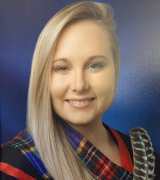 Brittany McBeath
Brittany McBeathQueen's |
Brittany McBeath is a Kanien’keha:ka (Mohawk) Masters student in the School of Kinesiology and Health Studies at Queen’s University. She is of mixed ancestry with her Indigenous roots in Tyendinaga Mohawk Territory, though she grew up off-reserve in Bowmanville, Ontario. She is currently studying health promotion, focusing on the prevention of Type 2 Diabetes within Indigenous communities across Canada, under the supervision of Dr. Lucie Lévesque. Through her experience with Right to Play and Four Directions Aboriginal Student Centre during her undergraduate career, she was a front-line worker promoting Type 2 Diabetes awareness and prevention through play-based activities as a mentor for Indigenous youth in the Kingston community. |
 Andrea Ianni
Andrea IanniQueen's |
Andrea is a master’s student studying health promotion under Dr. Lucie Lévesque at Queen’s University, which is situated on traditional Anishinaabe and Haudenosaunee Territory. Andrea is of mixed ancestry, with family originating from Cornwall Island in Akwesasne Mohawk Territory. Andrea’s research is on fostering community programming for Type II Diabetes prevention in Indigenous communities across Canada. This work is facilitated within the Kahnawake Schools Diabetes Prevention Project’s Community Mobilization Training, led by Dr. Alex McComber; and is rooted in community-based participatory principles. In pursing graduate studies, Andrea was excited by the opportunity to work within and experience the various partnering communities’ cultures and learn from the project’s incredible team of experienced researchers and community partners and participants. Andrea is very grateful for the opportunity and the hard work of everyone involved in IMNP, and is looking forward to the ongoing development and evolution of this network in the coming years. |
 Megan Paulin
Megan PaulinNipissing |
Megan Lozicki Paulin is a multi-disciplinary installation and performance artist. She was born and raised in North Bay, Ontario, and is from Mi'kmaq and Polish descent. She incorporates elements of visual art, archival materials, scientific research, sound, and projection while experimenting with site-specific art and community-based performance art. Megan is a core ensemble member for the company Aanmitaagzi Story Makers, has apprenticed under Master Tsimshian Carver Victor Reece and Sharon Jinkerson-Brass' Big Sky Storytelling Society, and has been mentored for the past five years by choreographer Penny Couchie and multi-artist/actor Sid Bobb. Megan studied Fine Arts and Indigenous Studies both formally and non-formally and has enjoyed travelling and working with youth in communities among the Nishnawbe-Aski Nation, Nipissing First Nation, and Nepal. She is currently completing her Master’s of Environmental Studies at Nipissing University under the supervision of Dr. Carly Dokis, focusing on themes surrounding harvesting, art making, and storytelling techniques and their impacts on cultural identity, continuity and resurgence; resource protection and monitoring; and the transmission of traditional knowledge. By remaining in conversation with the landscape, many indigenous artists are utilizing these practices as a means of healing and decolonizing not only themselves, but also the land and water. |
 Randi Ray
Randi RayNipissing |
Randi Ray n’dizhinikaaz. Flying Post miinwa N’swakamok n’doonjibaa. Randi Ray is Anishinaabe from Flying Post First Nation (Robinson-Superior Treaty Territory) but currently resides in Robinson-Huron Treaty territory where she calls Sudbury, her home. Randi is a 2nd year PhD student committed to sharing First Nations Chiefs stories as they work towards sustainable leadership development. Randi has always been passionate about improving health outcomes for Ontario's diverse Indigenous communities, growing up as a daughter of a First Nations Chief, she was able to gain the perspective and knowledge required to serve community. Randi is currently a Provincial Practice Lead for the Ontario Indigenous Cultural Safety program, which focuses on addressing anti-Indigenous stereotyping and discrimination within health and social services through education, knowledge exchange and collaboration. Previous to this role, Randi gained experience both educationally and professionally in the education and health sectors as an expert lobbyist and advocate, strategist, researcher and learner. Randi’s personal and professional experience has helped her to develop an extensive network of Indigenous and non-Indigenous political leaders, institutions, and community organizations. Randi is an active member of her community having had the opportunity to lead and contribute to community development via a multitude of board appointments, volunteerism, sport, drum circles and mentorship programming. Most importantly, she truly grounded by her partner and step-daughter who are her inspiration each and every day. |
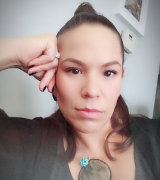 Vanessa Ambtman-Smith
Vanessa Ambtman-SmithWestern |
Tansi, I am Niizh Binesiwag (Two Thunderbirds) and a member of the Thunderbird Clan. I’m of mixed ancestry (Nehiyaw and Métis), and my lineage stems from the traditional territories of the Great Plains (Treaty 6 and 8 territory). I’m a wife and a mother to two beautiful children- Carter, 5 and Carolena, 2. As a 60’s scooper and Indigenous adoptee, I was raised within a Dutch and Trinidadian family, living in both Alberta and Manitoba. These diverse influences have shaped who I am today. Through a purposeful journey as a facilitator walking between two worlds, I have worked in the field of Indigenous health for the past 17 years. I seek to be a catalyst for change, and have cultivated a skill set rooted in advocacy, health equity, Indigenous cultural safety, community engagement and strategic planning. I am pursuing an M.A. in Geography at the University of Western Ontario, with the goal of completing a PhD. My research is focusing on relationships and traditional healing spaces within hospital contexts. In 2017, I received a graduate certificate in Health leadership from Royal Roads University, and have a B.A. in Native Studies from Trent University. I graduated from St. John's Ravenscourt School in Winnipeg. |
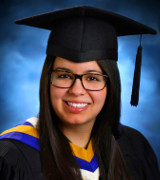 Robyn Rowe
Robyn RoweLaurentian |
Robyn Rowe is an Indigenous health researcher and a Ph.D. student in the School of Rural and Northern Health at Laurentian University. She is an Anishinaabe-kwe with connections to both Matachewan First Nation and Temagami First Nation on Bear Island. Robyn is passionate about conducting community-based First Nations research with First Nations populations on health issues that matter to communities. Her Ph.D. research focuses on First Nations youth mental wellness using mixed methods research techniques. Through community engagement and collaborative processes, this work hopes to address some of the wellness needs of those communities involved. |
 Justice Seidel
Justice SeidelLaurentian |
Justice Seidel is from the Northern, remote, First Nations community of Moose Factory Island and a member of the Moose Cree First Nation. She is a graduate student in the Masters of Indigenous Relations program at Laurentian University, where she is completing community-based health research with the Atikameksheng Anishnawbek community. Her project hopes to explore the experiences of First Nations informal caregivers to older adults with dementia to envision culturally appropriate supportive services. In addition, Justice’s project is a part of the MInD Care project being completed by Health Sciences North Research Institute. |
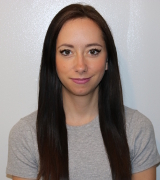 Staci Person
Staci PersonLakehead |
Staci Person is a 4th year doctoral student in the Clinical Psychology program at Lakehead University in Thunder Bay, Ontario. As a member of Red Rock Indian Band, she strives to incorporate Indigenous values into both her clinical work and her research. Her end goal is to become a registered Clinical Psychologist for Indigenous people. Staci’s current clinical work includes the supervised assessment of fetal alcohol spectrum disorder in children and adolescents and the treatment of First Nation adults with addictions. Her current research focuses primarily on Indigenous resilience and Indigenous leadership. In her spare time, Staci enjoys staying active with her two dogs and spending time with her family and friends camping and fishing. She is very humbled to be a scholarship recipient of Ontario’s Indigenous Mentorship Network. |
Seed Grant Awardees
 Laura Hall
Laura HallLaurentian |
Dr. Laura Hall is of Haudenosaunee and English/Canadian descent. She is a scholar born and raised on Anishinaabe territory in Sudbury, Ontario. Laura's work focuses on the gendered impacts of colonialism, on culture based sustainability initiatives, and on the ways that we can address Indigenous community needs--including the eradication of violence against Indigenous women, girls and Two-Spirit communities--through cultural resurgence. Laura's current projects include storytelling and Indigenous writing initiatives aimed at taking on some of the Eurocentric canons of futurity, horror and land-based writings. |
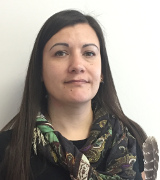 Joey-Lynn Wabie
Joey-Lynn WabieLaurentian |
Dr. Joey-Lynn Wabie is recognized by the Creator first through her Anishinaabe name: Ziigwankwe which translates into Spring Woman. She is an Algonquin Anishinaabe kwe from Wolf Lake First Nation in northwestern Quebec. Dr. Wabie is an assistant professor in the School of Indigenous Relations at Laurentian University in Atikameksheng Anishnabek territory: Sudbury, Ontario, Canada. Her research interests include traditional Indigenous women’s health, grassroots community organizing, and youth engagement. |


